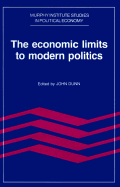Book contents
- Frontmatter
- Contents
- Preface
- List of contributors
- The economic limits to modern politics
- Introduction
- 1 The economic limits to modern politics
- 2 Free trade and the economic limits to national politics: neo-Machiavellian political economy reconsidered
- 3 The political limits to premodern economics
- 4 On some economic limits in politics
- 5 International liberalism reconsidered
- 6 Capitalism, socialism and democracy: compatibilities and contradictions
- Index
3 - The political limits to premodern economics
Published online by Cambridge University Press: 01 June 2011
- Frontmatter
- Contents
- Preface
- List of contributors
- The economic limits to modern politics
- Introduction
- 1 The economic limits to modern politics
- 2 Free trade and the economic limits to national politics: neo-Machiavellian political economy reconsidered
- 3 The political limits to premodern economics
- 4 On some economic limits in politics
- 5 International liberalism reconsidered
- 6 Capitalism, socialism and democracy: compatibilities and contradictions
- Index
Summary
To speak of “the economic limits to modern politics” suggests that the modern state operates in a context, and within limits, set for it by modern economics; that there are economic limits to what the state can do. What, then, were things like before there were modern economics? Could “the state,” or some other kind of political structure, do more than it can now that modern economics have arisen to condition it? I intend to show that this was by no means the case: that the efficacy of modern politics, its power and perhaps also its justice, have increased concurrently, though not exactly proportionately, with the increase in the efficacy of economic(s) arrangements: and particularly, with the increased efficacy of market mechanisms in human society. This is a major development in social history, and like all such developments it is attended with problems. We may be able to advance our understanding by some consideration of the way things used to be before they became what they are now.
Before I proceed with this subject, I had better explain the way in which I shall be presenting it. I look at the general history of society from the viewpoint not of an economic or even a social historian, but of a historian of social theory; a historian, that is, of the ways in which people have tried to understand and present the things that were happening to them in society.
- Type
- Chapter
- Information
- The Economic Limits to Modern Politics , pp. 121 - 141Publisher: Cambridge University PressPrint publication year: 1990
- 2
- Cited by

